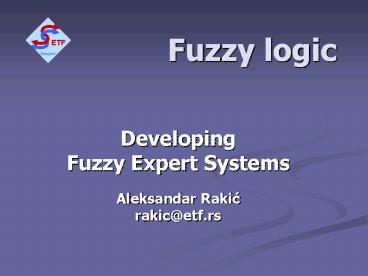Fuzzy logic 4 - PowerPoint PPT Presentation
1 / 15
Title:
Fuzzy logic 4
Description:
However, a triangle or a trapezoid can often provide an adequate representation ... that triangle-to-triangle and trapezoid-to-triangle fuzzy sets should overlap ... – PowerPoint PPT presentation
Number of Views:32
Avg rating:3.0/5.0
Title: Fuzzy logic 4
1
Fuzzy logic
Developing Fuzzy Expert Systems
Aleksandar Rakic rakic_at_etf.rs
2
Fuzzy Expert System Development Process
- Specify the problem define linguistic variables.
- Determine fuzzy sets.
- Bring out and construct fuzzy rules.
- Encode the fuzzy sets, fuzzy rules and procedures
to perform fuzzy inference into the expert
system. - Evaluate and tune the system.
3
Example Air Conditioner
1a. Specify the problem
Air-conditioning involves the delivery of air,
which can be warmed or cooled and have its
humidity raised or lowered. An air-conditioner is
an apparatus for controlling, especially
lowering, the temperature and humidity of an
enclosed space. An air-conditioner typically has
a fan which blows/cools/circulates fresh air and
has a cooler. The cooler is controlled by a
thermostat. Generally, the amount of air being
compressed is proportional to the ambient
temperature.
1b. Define linguistic variables
- Ambient Temperature
- Air-conditioner Fan Speed
4
2. Determine Fuzzy Sets
Fuzzy sets can have a variety of
shapes. However, a triangle or a trapezoid can
often provide an adequate representation of the
expert knowledge, and at the same time,
significantly simplifies the process of
computation. Fuzzy sets are defined both for
input and output variables!
5
Example Air Conditioner
2. Determine Fuzzy Sets Temperature
0lt? (T)lt1
? (T)0
? (T)1
6
Example Air Conditioner
2. Determine Fuzzy Sets Fan Speed
7
Example Air Conditioner
3. Bring out and construct fuzzy rules
- To accomplish this task, we might ask the expert
to describe how the problem can be solved using
the fuzzy linguistic variables defined
previously. - Required knowledge also can be collected from
other sources such as books, computer databases,
flow diagrams and observed human behaviour.
- RULE 1 IF temp is cold THEN speed
is minimal - RULE 2 IF temp is cool THEN speed
is slow - RULE 3 IF temp is pleasant THEN speed
is medium - RULE 4 IF temp is warm THEN speed
is fast - RULE 5 IF temp is hot THEN speed
is blast
8
4. Encode the fuzzy sets, fuzzy rules and
procedures to perform fuzzy inference into
the expert system
- To accomplish this task, we may choose one of two
options - to build our system using a programming language
such as C/C or Pascal, or - to apply a fuzzy logic development tool such
asMATLAB Fuzzy Logic Toolbox or Fuzzy Knowledge
Builder.
9
5. Evaluate and tune the system
- The last, and the most laborious, task is to
evaluate and tune the system. We want to see
whether our fuzzy system meets the requirements
specified at the beginning. - Evaluation of the system output is performed for
test situations on the several representative
values of input variables. Fuzzy Logic
development tools often can generate surface to
help us evaluate and analyze the systems
performance. - Tuning of the system consists of reviewing,
adding and/or changing the membership functions
and rules in order to increase the performance of
the system.
10
Example Air Conditioner
5a. Evaluate the system
Consider a temperature of 16oC, use the system
to compute the optimal fan speed.
- RECALL Operation of a fuzzy expert system
- Fuzzification determination of the degree of
membership of crisp inputs in appropriate fuzzy
sets. - Inference evaluation of fuzzy rules to produce
an output for each rule. - Aggregation combination of the outputs of all
rules. - Defuzzification computation of crisp output
11
Example Air Conditioner
- Fuzzification
? Affected fuzzy sets COOL and PLEASANT
?PLSNT(T) T /2.5 - 6 16
/2.5 - 6 0.4
?COOL(T) T / 5 3.5 16 /
5 3.5 0.3
12
Example Air Conditioner
- Inference
- RULE 1 IF temp is cold THEN speed
is minimal - RULE 2 IF temp is cool THEN speed
is slow - RULE 3 IF temp is pleasant THEN speed
is medium - RULE 4 IF temp is warm THEN speed
is fast - RULE 5 IF temp is hot THEN speed
is blast
13
Example Air Conditioner
- Aggregation
speed is slow (0.3)
speed is medium (0.4)
- Defuzzification
14
Input Output Plot
Example Air Conditionerone input one
outputgives nonlinear transfer characteristic
More general exampletwo inputs one output
gives 3D transfer surface
15
5b. Tune fuzzy system to improve performance
- Review model input and output variables, and if
required redefine their ranges. - Review the fuzzy sets, and if required define
additional sets on the universe of discourse. The
use of wide fuzzy sets may cause the fuzzy
system to perform roughly. - Provide sufficient overlap between neighbouring
sets. It is suggested that triangle-to-triangle
and trapezoid-to-triangle fuzzy sets should
overlap between 25 to 50 of their bases. - Review the existing rules, and if required add
new rules to the rule base. - Examine the rule base for opportunities to write
hedge rules to capture the pathological behaviour
of the system. - Adjust the rule execution weights. Most fuzzy
logic tools allow control of the importance of
rules by changing a weight multiplier. - Revise shapes of the fuzzy sets. In most cases,
fuzzy systems are highly tolerant of a shape
approximation.































